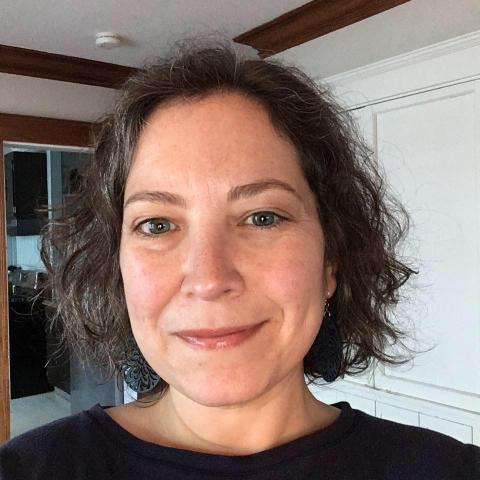
Jessica Kantrowitz is a writer and editor living in Boston. Her work has been published on Think Christian, the Our Bible App, and The Good Men Project, and shared widely throughout social media. Her first book, The Long Night: Readings and Stories to Help You Through Depression, comes out through Fortress Press in May, 2020. You can find her at her blog, Ten Thousand Places, and on Twitter.
Posts By This Author
What Would Madeleine L’Engle Do?

Illustration of Madeleine L'Engle, by molosovsky / Flickr.com
Though the inaugural Madeline L’Engle conference felt like a safe haven as we gathered in the cozy glow of art, and fellowship, we were all still very aware of a similar sense of imminent evil in our country and the world at large. We are no longer in the Cold War, but the uncertainty of the impeachment hearings, of uncontrollable wildfires at home and abroad, of the refugee crisis and the hardening of hearts at the borders hang over us daily. Just as is often asked these days about Fred Rogers, we at the conference found ourselves murmuring, “What would Madeleine L’Engle think? What would she do?”
What Does it Mean to Suffer with Those who Suffer?
I’ve always been terrified of pain. Not physical pain like migraines or plantar fasciitis in my heel. Those pains are frustrating, but I live with them. It’s the pain of loss that I fear, the inevitable death of someone that I love. I thought I’d curated a pretty safe life for myself: I’m not married, I don’t have children. I still have my childhood terror of losing my parents, but I’ve been working my whole life to be ready for that so it doesn’t destroy me. I’ve been trying to brace myself and let go at the same time. But loss is not a mid-term exam that we can study for — it comes whether we’ve practiced for it or not, and always seems to find us unprepared.
The Nonprofit Organizations Supporting Family Reunification
Saturday evening a story broke on The Washington Post that 29 parents were at the U.S. border with legal advocates, reapplying for asylum and attempting to get back the children that had been taken from them into U.S. custody. At the same time, Glennon Doyle and her nonprofit group Together Rising sent out an email giving more background on how those 29 parents were found and brought together to the border. Two of Together Rising’s board members, Liz Book and Glennon’s sister Amanda Doyle, were there with the families and sending live video updates. Initially, they were told that there was no capacity to process the asylum seekers — but around 8 p.m. Saturday they began allowing all 29 parents and their families to enter.
The Canonical Tweets of Lin-Manuel Miranda

Lin-Manuel Miranda joins the Families Belong Together march in Washington, D.C., June 30. Terry Underwood Evans / Shutterstock.com
I look for his tweets in the morning, and I put off going to bed until he tweets at night. It’s evening now, and I’ve had a hard day, and struggled with my work, and I’m waiting for today’s benediction. I’m waiting to be told what I already know I will be told, because it is part of the liturgy, and because it will be a reprise of this morning’s tweet. Still, I’m eager to read the words.
Weeping Responsibly
But Stewart-Bouley’s and Ajayi’s articles give me insight into my housemate’s response. My story of crying at the Israeli border seemed innocuous to me, a way of laughing at my own emotional frailty, but I can now see how it would seem like a veiled message of my power to my black friend — a power that she doesn’t have. As a white woman, I walk a delicate line between being hurt by misogyny and white supremacy and benefiting from it. When I experience the pain of limitations at work, of being put down and dismissed by male colleagues, professors, and pastors, and of outright sexual harassment and assault (yes, #metoo), it is hard to see the ways in which this same system is also supporting and benefitting me. The very attitude that frustrates and limits me, that women are inferior and need to be protected, also caters to me in ways that it does not cater to black women. And, as Stewart-Bouley points out, that catering can be fatal.


